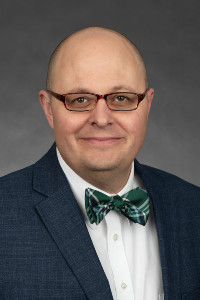
Adam C. Bradford
Provost and Vice-President of Academic Affairs; Professor of English
Office: Museum Building 401
EDUCATION
Ph.D. University of Iowa
M.A. Brigham Young University
B.A. University of Utah
Dr. Adam Bradford joined Idaho State University in the position of Dean of Graduate Studies. He then moved over to Academic Affairs as acting Provost and eventually took over that position full-time. Since this is a full-time administrative position, he does not currently teach for the English and Philosophy department nor does he do general advising for our program.
Book
Communities of Death: Whitman, Poe, and the American Culture of Mourning, University of Missouri Press, 2014.
Selected Articles and Book Chapters
“The Inca in the Nineteenth-Century US Poetic Imaginary.” A Companion to American Poetry, edited by Mary Balkun, Paul Jaussen, and Jeffrey Gray, Wiley Blackwell, 2022.
"A Critical Congeries: Forty-Five Theses for Poe," Poe Studies: History, Theory, Interpretation 52 (2019), 8-18.
“Any Peculiar Taste or Prepossession”?: Poe and the Antebellum Registers of Authorial Interpretation. In Poe Studies: History, Theory, Interpretation 51 (2018).
“Embodying the Book: Mourning for the Masses in Walt Whitman’s Drum-Taps.” Mickle Street Review: An Electronic Journal of Whitman and American Studies 21 (2016).
“The Collaborative Construction of a Death-Defying Cryptext: Walt Whitman’s Leaves of Grass.” Sentimentalism in Nineteenth-Century America: Literary and Cultural Practices. Eds. Mary De Jong with Paula Bernat Bennett. (Farleigh Dickinson UP, 2013), 300-319.
Awards/Honors
James W. Gargano Award, Poe Studies Association, 2018.
Faculty of Distinction Award Nominee, Broward President’s Community Council, Florida Atlantic University; 2011.
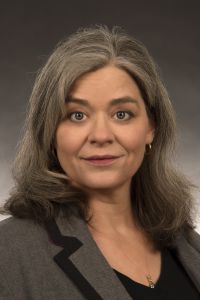
Carlen Donovan
Senior Lecturer in English
Office: LA 207-F
EDUCATION
MA, English (2002), Idaho State University
BA, English (1997), Idaho State University
I’ve been a full-time lecturer in Idaho State’s English Department since 2002, and before that, an adjunct instructor for English and other departments since 1996.
My specialties as a lecturer include composition, film, and professional communication. I regularly offer writing classes online, and I’m currently working on earning Quality Matters certification for one those courses; my goal is to achieve “in-seat” effects in an online class. I’m also proud to be teaching one of the central courses for ISU’s just-launched Film Studies minor.
My other interests include visual rhetoric and typography, horror and science fiction film, and 20th century female film directors.
My goal as a teacher is always to try to raise my students’ eyes to the horizon; I hope they can imagine employing the critical reading, thinking, and writing practices they begin to learn in my courses in settings beyond the university.
Courses Taught
3308: Business Communications
3307: Professional and Technical Writing
1175: Literature and Ideas
1126: Art of Film I
1102: Writing and Rhetoric II
1101: Writing and Rhetoric I
.jpg)
William Donovan
Senior Lecturer in English
Office: LA 207-E
EDUCATION
MA, English (2007), Idaho State University
BA, American Studies (2002), Idaho State University
My teaching is designed to try to reach the variety of learning styles my students employ. Whether in the composition sequence or the introductory literature courses, I employ a system of reading, lecture, discussion, and application. I know, from my experience working as a tutor in a writing lab, that the lower the teacher/student ratio, the more effective the teaching and learning. With this in mind, I seek to increase the number of times a student can have more one-on-one time. Teaching and learning should be a self-reflective process. As an educator, this means that I need to be aware of what has been successful for my students in the past so that I can implement or improve upon this in the future; likewise, I need to be aware of what has not been successful so that I can drop or modify that technique for future classes.
Selected Awards and Honors
LDSSA Excellence in Education Award, 2014
CASE Professor of the Year nominee, 2014
Courses Taught
2210: American Cultural Studies
1175: Literature and Ideas
1115: Modern Irish Literature
1102: Writing and Rhetoric II
1101: Writing and Rhetoric I
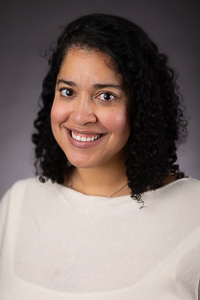
Gibette Encarnación
Assistant Professor of English
Office: LA 232
Research Areas
20th and 21st century American literature
Transnational and diasporic studies
Trauma and cultural trauma theory
EDUCATION
Doctor of Philosophy in English, University of Kansas, 2022
Master of Arts in English, Andrews University, 2013
Bachelor of Arts in English, Walla Walla University, 2010
My work centers on contemporary American literature, particularly that by Latinx and Afro-Latinx writers. My major research concern is in exploring transnational connections forged by immigrant communities between the United States and their nations of origin. I seek to place the U.S. in a larger global context and trace worldwide cultural and literary influences on American identity.
My current research project connects Dominican diasporic literature written in the U.S. to the literature and history of the Dominican Republic. I examine how major tragedies in the nation’s past have shaped the history of the nation and how in turn that history has shaped modern culture and particularly the racial identity of Dominican citizens at home and abroad. I argue that tragedies are only memorialized in the collective psyche when they affect the nation’s White-identifying population, which serves to further marginalize Blackness from group identification and belonging.
My teaching objectives are to expand the definition of what is considered literature and question who can speak to the canon of American cultural character. I seek to give every student in the classroom texts where they can see themselves and their genuine struggles reflected. In my classes we are all equally tasked with taking on the authority to speak back to the field of literary and cultural studies and argue for the changes that we want to see.
Courses Taught
2210: American Cultural Studies
1102: Writing and Rhetoric II

Susan Goslee
Associate Professor of English
Office: LA 217
RESEARCH AREAS
Creative writing
Magazine editing
EDUCATION
PhD, Literature and Creative Writing (2007), University of Utah
MFA, Creative Writing- Poetry (2001), University of Alabama
BA, Psychology (1993), Swarthmore College
Current project
My current project emphasizes the role of fantasy in systems that transport and de-humanize their subjects. More specifically, I use the lyric to study coerced or violent displacement—from the flooding in the development of the Tennessee Valley Authority in the 1930s, to extraordinary rendition by the CIA, to child trafficking—and an understanding of systemic exploitation informs my approach to this topic. Appalachia figures prominently in the manuscript-in-progress as a case study of oppressive systems’ mechanisms.
I think the lyric, in particular, is well-suited for such destabilizations because systems that call attention to themselves, such as patterns of rhythm and sound, compose this form. Since the lyric spotlights its own machinery, it is able to interrogate the systemic.
This project grows out of issues explored in my completed poetry manuscript “Welcome to Kingdom City,” which has most recently been a semi-finalist for the 2017 Brittingham and Pollak Prizes, the 2016 Pleiades Editors’ Prize, and the 2015 Lexi Rudnitsky First Book Prize. For the poem series that anchors the manuscript, I use a derelict private game park, Ligertown, that ran in the 1990s in southeastern Idaho to explore humans’ contradictory response to fierce creatures and how their muteness (relative to human speech) enables such different reactions. Other poems examine isolation and imprisonment in other forms.
Recent Publications
"Poem" Stirring: A Literary Collection
"Wark, R., and Peck, C. 1982. Behavioral consequences of early visual exposure to contours of a single orientation. Developmental Brain Research. Oct Vol 5 (2): 218-221" Stirring: A Literary Collection
“Ligertown: Elegy” Western Humanities Review
“Ligertown: Welcome to Kingdom City” Western Humanities Review
“Ligertown: The schoolyard lion” Juked: Online
“Ligertown: Introduction” Permafrost: Online
“Ligertown: Responding Officer” Permafrost: Online
“Interregnum” Volt
“Extraordinary rendition, 2004” The Southampton Review
Editorial Position
Poetry Editor at Prompt Press (promptpress.org)
Faculty Advisor
Black Rock & Sage, ISU’s student journal of creative works (blackrockandsage.org)
Teaching Interests
Creative writing: poetry and prose, Literary Magazine Production, Creative Writing in the Schools, 19th Century British Literature
Specializations
Creative writing: poetry
National and campus literary magazines
ISU Awards and Honors
Distinguished Teacher, 2012
Outstanding Service, 2010
Courses Taught
6662: Graduate Seminar in Creative Writing
4494: Senior Seminar in Creative Writing
4466/5566: Early Nineteenth-Century Literature: British
4409/5509: Literary Journal Production
4406/5506: Advanced Creative Writing Workshop
4405/5505: Creative Writing in the Schools
3306: Intermediate Creative Writing Workshop
2268: Survey of British Literature II: 19th Century to Present
2206: Creative Writing Workshop
1102: Writing and Rhetoric II

Hal Hellwig- On Sabbatical during the 2025-2026 academic year
Professor of English
Office: LA 207-D
RESEARCH AREAS
19th & 20th century American literature
Film studies
Mark Twain
EDUCATION
PhD in English (1985), University of California, Los Angeles
MA in English (1976), California State University, Fullerton
BA in English (1972), State University of New York, Buffalo
I’m a recognized Mark Twain scholar, having published a book on his travel works, and I present conference papers on his work internationally and nationally. I have a book published in 2023, American Film Noir Genres, Characters, and Settings with Lexington Books.
A definition of film noir includes the notion that an individual (usually male) finds himself lost in an urban setting, beset by corrupt or criminal characters, seduced by a devious woman (the stock character, femme fatale), and attempts to right wrongs committed in that film. The setting can include a diseased large urban area--Los Angeles, Chicago, San Francisco, and New York the usual cesspools of humanity--with these cities described in terms of a labyrinth or maze, which the protagonist needs to navigate to survive. It rains a lot, daylight scenes are rare, and the city is filled with dark creatures of the night.
I argue that film noir depends a good deal on the literature embedded in American culture well before the immediate experiences and influences of the 1930's, that American literature of earlier periods- to those writers deriving from the Transcendentalist period- helped created the environment for film noir. Film noir evolved from a literary tradition to a set of film adaptations that focus on the isolated self in society and transformed itself into a convention-bound set of genres much different from the defective detective or manipulated male found in classic films such as Out of the Past, The Big Sleep, or Double Indemnity. These new genres include science fiction in television and movies; comedy in television; Western in movies and in television; forensic science in television; and an assortment of urban crime shows in television. I am negotiating with several film production companies on how to turn this book into a documentary film.
I spent some time in 2017 at the Vittore Branca Center, a residential center sponsored by the Fondazione Giorgio Cini (an educational/cultural institution based on the island of San Giorgio Maggiore), working in the Nuova Manica Lunga, a library with extensive material on art history, on the culture of Venice, on music, on theatre, and on literature.
This pilot research led to my current work on a book that will examine the impact of European Catholicism (and cathedral architecture, art and symbols) on American writers (at least 45) who spent time in Italy, France, and Germany.
As a semi-finalist in the Fulbright application process, I spent three months in Freiburg, Germany, October through December, 2024, establishing myself in the culture and presenting lectures at several universities, including those in Bamberg, Halle, and Eichstatt. I plan to return in 2025-26 to continue my research and to write my next book on the influence of European Catholicism on American writers.
I have expertise in the fields of rhetoric and composition, with publications in those areas, and with administrative experience as the Director of Composition (nearly nine years).
Books
American Film Noir Genres, Characters, and Settings. Lanham, Maryland: Lexington Books (2023)
Mark Twain's Travel Literature: The Odyssey of a Mind. Jefferson, North Carolina: McFarland Press (2008).
Selected Articles and Book Chapters
"Innocence at Home": The Cultural Influence of Italy on Mark Twain's Life,” Mark Twain Journal, Volume 59, Number 2, Fall 2021. 77-105.
“Frasier: A Film Noir Comedy,” Journal of Popular Film and Television. Volume 48, Issue 1. 2-12. 2020.
Book Review: Mark Twain Annual, Volume 16, 186-189. On Wonder and Irony with Henry James and Mark Twain in the Venice Ducal Palace. Rosella Mamoli Zorzi. Venice: Supernova, 2018.
Book Review: South Central Review: The Journal of the South Central Modern Language Association. Vol. 34, No. 2. Summer 2017. On Faulkner and Film, edited by Philip Lurie and Ann J. Abadie, introduction by Philip Lurie. Jackson: University Press of Mississippi, 2014. 72-75.
“William Blake’s Jerusalem and the Los Angeles of Film Noir,” Philosophy and Literature, Volume 38, Number 1, April 2014.
"Venice and the Decline of the West: Henry James, Mark Twain, and the Memorials of the Past," Henry James Today, John Carlos Rowe, editor, Cambridge Scholars Press, 2014.
Recent Presentations
“Family Discord: The Politics of Racial Time Unhinged in Baldwin’s If Beale Street Could Talk and Barry Jenkins’ Adaptation, Beale Street,” University of Bamberg, Germany, December 3, 2024.
“Mere Copyists: Symbol and Vision in Nathaniel Hawthorne’s The Marble Faun and the Impact of Hawthorne’s European Catholicism on Edith Wharton’s “Souls Belated” and Ernest Hemingway’s The Sun Also Rises,” Catholic University of Eichstatt, Germany, November 20, 2024.
In-class discussion of Mark Twain research as visiting scholar. Advanced class, Professor Holger Kersten, University of Halle, December 17, 2024.
“American Writers, Sculptors, and Artists: Recognizing the Secularized Religious Artifact in Venice,” Modern Language Association Convention. Philadelphia: January 2024.
“The Political Theatre in Mark Twain’s Illustrated Travel Works.” The Ninth International Conference on the State of Mark Twain Studies. Elmira College, New York. August 6, 2022.
"Venice, Italy, and the Influence on Twain's Life and Satire on Capitalism," 'Humor in America' conference sponsored by the American Humor Studies Association and the Mark Twain Circle of America. Chicago, Illinois. July 12-14, 2018.
"'Innocence at Home': Mark Twain's Italian Villa, Stormfield, and the Cultural Influence of Italy on Quarry Farm." The Eighth International Conference on the State of Mark Twain Studies. Elmira College, New York. August 5, 2017.
"Mark Twain's The Innocents Abroad: Among the Monuments of Time." Presented to the faculty and students at the University of Venice. April 10, 2017. Ca'Bernardo, Sala B. Organizzato da Daniela Ciari Forza. Universta Ca'Foscari Venezia. Dipartimento di Studie Linguistici e Culturali Comparati.
"Venice: Mark Twain, A Vulgar Tourist Among the Phantoms of Poetry and Romance." Mark Twain Special Session. Dallas, Texas: South Central Modern Language Association Convention, November 3, 2016.
"Classroom Example of Twain's Following the Equator as a Digital Edition." Program arranged by the Modern Language Association Committee on Scholarly Editions, a session entitled "Pedagogy and Digital Editions." Vancouver: Modern Language Association Convention. January 2015.
"'Innocence at Home': Stormfield, Quarry Farm, and Mark Twain's Amanuensis of Time." The Seventh International Conference on the State of Mark Twain Studies. Elmira College, New York. August 2, 2013.
"Venice: Confluence of Images, Myth, and Vision," Henry James, Mark Twain, and Globalization. Program arranged by the Mark Twain Circle of America and the Henry James Society. Boston, Massachusetts: Modern Language Association Convention, January 4, 2013.
Courses Taught
English 6624: American Writers in Europe (partially online)
English 6666: Nineteenth Century Literature - Travel Literature
English 6627: Major Authors - Mark Twain
English 6621: Place in Detective Fiction (partially online)
English 3353: The West in American Literature
English 3308: Business Communications (both classroom and online)
English 3307: Professional and Technical Writing (both classroom and online)
English 1126: Art of Film I
English 1102: Writing and Rhetoric II (both classroom and online)
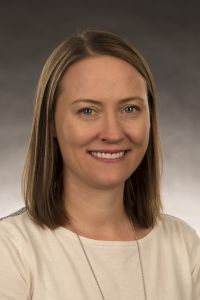
Bethany Schultz Hurst
Professor of English
Office: LA 156
RESEARCH AREAS
Creative writing, contemporary American poetry
Creative writing, the lyric essay
EDUCATION
MFA, Creative Writing (2003), Eastern Washington University
BA, English (2000), Colorado State University
"To be haunted — one need not be a house" —Emily Dickinson
In my poetry, I aim to employ lyric form to explore the ways in which the contemporary United States West, in particular, may be haunted by the ideologies that drove 19th-century white settlement and continue to justify land-use policy today. Of the lyric form, Helen Vendler notes that “we are drawn in by the architecture of the poem—the manner in which its parts are arranged, so as to make a structure that reflects emotional intensity.” Because of the lyric’s relationship to both interiority and artifice/construction, I think of it as an ideal formal approach for investigating the impact of collective cultural imaginations on built environments.
Book
Blueprint and Ruin. Southern Indiana Review Press, 2022. Michael Waters Poetry Prize.
Miss Lost Nation. Anhinga Press, 2014. Robert Dana-Anhinga Prize for Poetry, selected by Richard Blanco. Finalist, 2016 Kate Tufts Discovery Award.
Selected Recent/Forthcoming Poems in Journals
"Exposure," Southern Humanities Review
"The Birds Are Always in the Corn," Terrain.org
"Donner Party," "Pinta, Nina, Santa Maria," and "Mylar," South Dakota Review
“Keepsake” Grist
“what now have you been eating?” Image
“Notes on Pet Monkeys and How to Manage Them: Classification, Cage Items, Ailments, Concluding Observations” The Florida Review
“Evensong (O Bewildering Picture)” Ecotone
“Exile Queen” New Ohio Review
“Broken Water Main” Split Rock Review (Pushcart Prize Nomination)
“No Season for Figs” and “Parable” Ploughshares
“Notes on Pet Monkeys and How to Manage Them: General Management” Juked (Pushcart Prize Nomination)
"Seascape with Evacuating Animals" Gulf Coast
Selected Awards/Honors
Humboldt Prize for Poetry. The Florida Review, 2020
Runner-up, Auburn Witness Prize for Poetry. Southern Humanities Review, 2020.
Idaho Commission on the Arts Literary Fellowship, 2017
Finalist, Kate Tufts Discovery Award. Claremont Graduate College, 2016
The Best American Poetry 2015
Master Researcher, ISU, 2015
Outstanding Service, ISU, 2011
Distinguished Teacher, ISU, 2008
Courses Taught
6662: Creative Writing Seminar: The Political Poem
4494: Senior Seminar: Creative Writing
4408/5508: Advanced Creative Writing Workshop: Prose
4406/5506: Advanced Creative Writing Workshop: Poetry
3306: Intermediate Creative Writing Workshop
2206: Introduction to Creative Writing Workshop
1102: Writing and Rhetoric II
1101: Writing and Rhetoric I
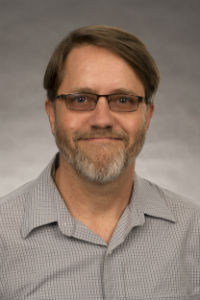
Alan Johnson
Professor of English
RESEARCH AREAS
World anglophone literatures
Comparative literature
Postcolonial literature and theory
EDUCATION
PhD, English (1998), University of California, Riverside
MA, English (1988), University of Virginia
BA, English (1984), Southern Illinois University
My expertise is in postcolonial literature and theory, with an emphasis on India, where I was raised. Like my colleagues, I teach a variety of other courses besides my specialty, such as postcolonial ecocriticism, history of the novel, religion and literature, major figures (Rushdie, Naipaul), , literary theory, comparative literature, national literatures, writing about literature, honors humanities, first year writing, and an honors class on Hindi (Bollywood) film. In 2010 I was a Fulbright-Nehru lecturer in India, focusing on “globalization and the place of literature,” and I've traveled throughout India for research, conferences, and talks. My current project, for which I received a 2016-17 Fulbright-Nehru research award, is an interdisciplinary study of depictions of forests in Indian literature. My interdisciplinary interests have taken me to conferences around the U.S., such as ASLE and RMMLA, as well as to India, Sri Lanka, Singapore, the Philippines, England, France, and Canada, and to literary festivals in India. I currently serve as the university’s Fulbright Program Adviser.
Books- Academic
India’s Forests, Real and Imagined: Writing the Modern Nation. London: Bloomsbury, January 2023.
Postcolonial Literature Today, co-edited with Jagdish Batra (New Delhi: Prestige, 2015).
Out of Bounds: Anglo-Indian Literature and the Geography of Displacement (Univ. of Hawai'i, 2011).
Books- Novel
Family Plot (as A. G. Johnson), Vishwakarma Publishers, India. Mystery novelist Sujata Massey calls it “an accomplished” novel that “meld[s] the beauty and rich history of South India with a puzzling crime. I quickly fell under the spell of Johnson's elegant writing and innate understanding of local voices, history and hill station life.”
Select Journal Articles and Book Chapters
“Da Gama to Ghosh, and Points in Between: Littoral Forests and Cultures of Trade.” Journal of Southeast Asian Ecocriticism inaugural issue (Singapore), August 2021. 18-41.
“Shadows of Enchantment in Indian Forest Fiction: Mahasweta Devi’s “The Hunt” and Hansda Sowvendra Shekhar’s The Mysterious Ailment of Rupi Baskey,” in Dwellings in Enchantment: Writing and Reenchanting the Earth, ed. Bénédicte Meillon (France), Rowman & Littlefield, Nov. 2020.
“'Mera Joota Hai Japani': Memory, Context, Play," in Osmania Journal of English Studies (Hyderabad, India), 2019 issue, pp.1-14.
“Teaching Amitav Ghosh in an Upper Division Single Author Course,” Teaching Amitav Ghosh MLA series volume, ed. Gaurav Desai and John Hawley; April 2019
“Fraudulence, Knowledge, and Post-Imperial Geographies in John Le Carré’s Fiction: A Cavellian Postcolonial Reading,” by Alan Johnson, in Stanley Cavell on Aesthetic Understanding, ed. Garry L. Hagberg. Springer, Nov. 2018, 265-292 https://link.springer.com/book/10.1007/978-3-319-97466-8
“Narrative Identities in India’s Global Age,” in Narrative, Identity, and Academic Community in Higher Education, ed. Brian Attebery et al. Routledge, 2017. 47-67
“‘Going Jungli’: Flora Annie Steel’s Wild Civility,” Flora Annie Steel: A Critical Study of an Unconventional Memsahib, ed. Susmita Roye, University of Alberta Press, 123-160
“Cross-cultural Humanities,” Rendezvous: Journal of Arts & Letters 43:1 & 2, special issue on State of the Humanities, ed. S. Sieber and A. Petit, Spring 2017: 9-18
"Sacred Forest, Maternal Space, and National Narrative in Mahasweta Devi's Fiction," ISLE: Interdisciplinary Studies in Literature and Environment, 23:2 (Summer 2016): 506-525
“Landscapes of Terror and Nation in Hindi Film: The Case of Dil Se,” Weber—The Contemporary West, special South Asia Focus issue, ed. Michael Wutz, T. Vijay Kumar, and Kerstin Schmidt, 32:2 (Spr/Sum 2016): 35-48
“Local Writing is World Writing: Reflections on Literary Studies in a Global Age,” The Atlantic Critical Review (India) 13:2 (April-June 2014): 1-15
“The American Hero’s Passage to India: Geography, Frontier Myths, and Planetary Perspectives,” Writing Today (India) 1:2 (Jan. 2014): 1-12
“Ghosts of Irish Famine in J. G. Farrell’s The Siege of Krishnapur,” Journal of Commonwealth Literature (London) 46:2 (June 2011): 275-92
“The Savage City: Locating Colonial Modernity,” Nineteenth-Century Contexts 25.4 (2003): 315-32
"Culture, Metaphor, Art: The Context of Beauty,” Rendezvous: Idaho State University Journal of Arts and Letters 36:1 (Fall 2000): 23-36
“Club Members?: Reading John Masters’s Bhowani Junction,” The Journal of Commonwealth Literature (London), Summer 2000: 3-26
Other Publications
“Wasteland, Forest, and Emplacement: The Promise (and Peril) of Narration,” Re-Thinking Environment: Literature, Ethics and Praxis, ed. Shruti Das; New Delhi: Authors Press, 2016. 21-39
"Anglo-Indians and Globalization," The Way We Are, ed. L. Crumb and D. Van Veldhuisen (New York: CTR Inc., 2008): 252-56
"Picturing Violence in an Age of Technological Reproduction," Literature in Times of Violence, ed. G. R. Kataria and S. Mandal. Delhi: Prestige Books, 2008
Awards/Honors
Fulbright-Nehru awards to India, 2010 (lecturer) and 2016-17 (researcher)
Idaho Humanities Center award for research in India, 2014
Two sabbaticals, as well as several Idaho State University grants
Outstanding Researcher, ISU, 2012
Courses Taught
Postcolonial, comparative, and world literatures; graduate seminars in literary theory, religion and literature, history of the novel, and politics and the novel; major figures; national literatures; introductory literature; senior seminars on such topics as ecocriticism; first year writing; Honors Humanities; and Honors short course on Hindi film
Additional information, including some papers, CV, is available at Academia.edu and at alangjohnson.wordpress.com.
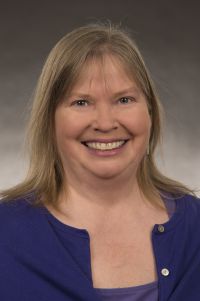
Margaret Johnson
Professor of English; Director of Composition
Office: LA 235
RESEARCH AREAS
Composition and writing pedagogy
Postmodern literature/American literature and literature pedagogy
Film and television studies
EDUCATION
PhD, English (1998), University of Oregon
MA, English (1990), San Jose State University
BS, Business Administration - Accounting (1986), University of California, Berkeley
I work in the fields of rhetoric and composition, postmodern fiction, and film studies. In the area of rhetoric and composition, my work focuses on pedagogical issues; in postmodern fiction, I deal mostly with issues of style and form. My research in film deals primarily with genre studies and queer theory. I regularly teach courses in all three areas.
Selected Publications
My work has appeared in the following publications: Quarterly Review of Film and Video, Film-Philosophy Quarterly, Popular Culture in Libraries, Genre, The Encyclopedia of Novels into Film, and CEA Forum. I have an article in the book The Geographical Imagination of Annie Proulx: Rethinking Regionalism (edited by Alex Hunt), and I wrote the Instructor’s Manual for The Shape of Reason, 3rd edition. My book Literary Studies: A Practical Guide was co-authored with Tison Pugh.
Courses Taught
6642: Seminar in Oral/Popular Culture: Film Adaptation
6632: Seminar in Teaching Literature
6631: Seminar in Teaching Writing
6627: Seminar in Major Literary Figures: John Barth and Don DeLillo
6625: Seminar in a Literary Period: The Problem(s) of the Postmodern
6610: Careers in English
4493: Senior Seminar in Professional Writing
4492: Senior Seminar in Literature: The Problem of Fiction
4469/5569: Contemporary Literature: Postmodernism
4431/5531: Teaching and Writing Projects
4401/5501: Advanced Composition
3323: Genre Studies in Drama
3308: Business Communications
3305: Art of Film II: Romantic Comedy
2278: Survey of American Literature II
2268: Survey of World Literature II
2267: Survey of World Literature I
1126: Art of Film I

Thomas Klein
Professor of English; Director of Graduate Studies in English
Office: LA 242
RESEARCH AREAS
Old English texts and artifacts
History of English, especially vocabulary
Medieval studies and literature
EDUCATION
PhD, Medieval Studies (1998), University of Toronto
MA, Medieval Studies (1992), University of Toronto
BA, Medieval Studies and the Epic (1990), Kenyon College
Diploma, Italian Language and Culture (1989), Università per Stranieri, Perugia, Italy
As a philologist, I'm interested in early medieval writing, and how knowledge is represented in physical form. Recently, I have written a series of articles on Anglo-Saxon riddles and inscribed objects, including the Franks Casket, the Staffordshire Hoard, and the Vindolanda tablets.
I enjoy teaching all my classes, from Composition to Old English. I find that there is always occasion for shared inquiry and discovery in the classroom, and I feel fortunate to be able to work with students and colleagues at ISU, as well as the larger community in Pocatello.
Selected Publications
"Scribal interpretation of problematic passages in Old English poetry: Insights from theories of textual difficulty," Studia Neophilologica (June 2024).
“Old English Wlitan and Wlatian: Poetic Verbs of Looking (and Seeing),” ANQ: A Quarterly Journal of Short Articles, Notes and Reviews, (September 2023).
“'Savage' and 'Medieval' in C. S. Lewis’s The Discarded Image," Neophilologus: Journal of Modern and Medieval Language and Literature (March 2023).
"Does preverbal Old English ge- have semantic or aspectual force?: evidence from the Dictionary of Old English." Studia Neophilologica (January 2022).
“Pater Occultus: The Latin Bern Riddles and their Place in Early Medieval Riddling,” Neophilologus: Journal of Modern and Medieval Language and Literature (July 2019).
“Old and New Technologies of Asynchronous Communication: Virtual Narratives and ‘Presence’”. In Narrative, Identity, and Academic Community in Higher Education, ed. Attebery, Gribas, McBeth, Sivitz, and Turley-Ames (Routledge, 2017).
"The Metaphorical Cloak of Exeter Book Riddle 83, 'Ore / Gold / Metal'," ANQ: A Quarterly Journal of Short Articles, Notes, and Reviews (June 2015).
"Of Water and the Spirit: Metaphorical Focus in Exeter Riddle 74." Review of English Studies (February 2015)
"The Non-Coherence of the Franks Casket: Reading Text, Image, and Design on an Early Anglo-Saxon Artifact." Viator (Summer 2014).
"The Inscribed Gold Strip in the Staffordshire Hoard: The Text and Script of an early Anglo-Saxon Biblical Inscription." Anglo-Saxon Studies in Archaeology and History (2013).
"Dialect and Word Choice in Old English: Two Case Studies with Old English Perception Verbs." Anglia: Journal of English Philology (2012).
"Anglo-Saxon Literacy and the Roman Letters on the Franks Casket." Studia Neophilologica (May 2009).
"The Ghostly Voice of Gossip in Faulkner's 'A Rose for Emily.'" The Explicator (Summer 2007).
"Stanc æfter stane (Beowulf, l. 2288): Philology, Narrative Context, and the Waking Dragon." Journal of English and Germanic Philology (January 2007).
"Six Colour Words in the Pearl Poet: Middle English Blake, Blayke, Blaht, Blo, Blwe and Ble." Studia Neophilologica (Spring 2000).
"The Old English Translation of Aldhelm’s Riddle Lorica." Review of English Studies (1997).
"In Praise of Bald Men: A Translation of Hucbald’s Ecloga de calvis." Comitatus (1996).
"Words for the Colour Orange in Italian." Quaderni d’italianistica (1994).
Awards/Honors
Outstanding Faculty Advisor, Idaho State University, 2022
Master Teacher, Idaho State University, 2017
Courses Taught
6662: Seminar in Medieval Literature: Medieval Women Mystics
6625: Cross-Cultural Encounters in the Middle Ages
4491: Senior Seminar in Literature
4490/5590: Topics in Folklore: Riddles and Charms
4487/5587: History of the English Language
4486/5586: Old English
4473/5573: Chaucer
4462/5562: Medieval Literature: Dream Visions of the Later Middle Ages
4462/5562: Medieval Literature: Epic and Romance
4461/5561: Classical Literature: Myth and Epic
3323: Genre Studies in Prose Fiction: The Short Story Sequence
2281: Introduction to Language Studies
2280: Grammar and Usage
2267: Survey of British Literature I
2211: Introduction to Literary Analysis
1175: Literature and Ideas
1115: Themes in Literature: Love and Death
1102: Writing and Rhetoric II
1101: Writing and Rhetoric I
HONS 1101: Honors Humanities I

Dawn Lattin
Senior Lecturer in English
Office: LA 207-B
EDUCATION
MA, English (2001), Idaho State University
BA, English (1997), Idaho State University
I earned my B.A. and M.A. in English at Idaho State University. My M.A. thesis concerned the Renaissance play, The Revenger's Tragedy (ca. 1605), and its context in the development of Early Modern "anatomy theaters." At Idaho State University, I enjoy teaching Introduction to Literature and composition courses at all levels.
My additional training includes College Reading and Learning Association Composition Tutoring certificates and training in a variety of web applications. I was among the first of our lecturers to offer composition online.
In 2016, I earned my Teaching Online Certificate through Quality Matters (QM), a nationally recognized professional development and peer review program designed to certify the quality of online and hybrid courses. In 2018, I also earned my Quality Matters Peer Reviewer certification and currently serve on QM peer review committees to review courses for other institutions, while in 2023, I was certified as a QM Master Course Reviewer, which allows me to chair peer review teams and work more closely with faculty and instructional designers in the peer review process as they create online learning environments where students can succeed.
In 2019, I completed eISU’s Quality+ program, and after participating in an extensive QM peer review process, taught ISU’s first QM-certified online course, English 1102: Writing and Rhetoric II. In 2022, both my online Literature and Ideas (English 1175) and Professional and Technical Writing (English 3307) earned their QM certifications. In 2024, my online Business Communications (English 3308) was certified by QM.
Courses Taught
3308: Business Communications
3307: Professional and Technical Writing
1175: Literature and Ideas
1102: Writing and Rhetoric II
1101 and 1101-Plus: Writing and Rhetoric I- Plus

Sonja Launspach
Professor of English
Office: LA 220
RESEARCH AREAS
Sociolinguistics
Discourse and conversation analysis
Linguistics and writing
EDUCATION
PhD, Linguistics (1998), University of South Carolina
MA, Linguistics (1995), University of South Carolina
BA, German Language and Literature (1982), Washington University
BFA, Graphic Design (1982), Washington University
Research Interests
I am a sociolinguist and as a sociolinguist, I study how language is used in everyday contexts and social situations. My research interests include conversation analysis, discourse analysis, narrative, dialect studies and studying writing through a linguistics lens. I've recently become interested in the intersection between linguistics and pedagogy. I teach the linguistics courses for our majors, courses in the TESOL certificate program and co-direct the interdepartmental linguistics minor.
Book
Launspach S., & Aull, L. (2020). A Case-based Approach to Argumentative Writing. Oxford: Oxford University Press.
Selected Publications
2021 "Conflicting ideologies: Language diversity in the composition classroom." In G. Clements & M. Petray (Eds.), Linguistic Discrimination in U.S. Higher Education: Power, Prejudice, Impacts, and Remedies. Routledge.
2017 "Making the Case: The case method, motivation, and the teaching of argument." Co-author, Angela Petit. Teaching English in the Two Year College 44:4.
2017 "Stories and objects: Narrative and the construction of connective links in the American quilting guild." Book chapter in Narrative, Identity, and Academic Community in Higher Education. (Eds.) Brian Attebery, John Gribas, Mark K. McBeth, Paul Sivitz, and Kandi Turley-Ames. New York: Routledge.
2016 "Exemplar narratives: Resources for maintaining solidarity and upholding group standards in an American Quilting Guild." Text and Talk 36:2. 179-197.
2013 "'That really was a good method for beginners:' How narratives are used to situate objects and techniques in a quilting guild." Narrative Inquiry. Vol. 23, No. 2, pp. 262-282.
2012 "The journey to Idaho: The use of oral history tapes and census data to trace the history of dialect features." Idaho Yesterdays. Vol. 53, No. 1 & 2.
2008 "The Role of Talk in Small Writing Groups: Building declarative and procedural knowledge for basic writers." Journal of Basic Writing. Vol. 27, No. 2, pp. 93-117.
2003 "Compliments and self deprecatory assessments: A quilter's resource in the co-construction of performance events." RASK International Journal of Language and Communication. No. 18, Spring 2003.
2000 "Literal or Loose Talk: The Negotiation of Meaning on an Internet Discussion List." Words on the Web: Computer Mediated Communication. Ed. by Lyn Pemberton and Simon Schurville. Exeter, UK: Intellect Ltd.
2000 "Beyond Grammar: Linguistics in the Composition Classroom" with Martha Thomas. In our Own Voice: Graduate Students Teach Writing. Ed. by Tina Good and Leanne Warshauer. New York: Allyn Bacon.
Courses Taught
6685: Seminar in Linguistics
6681: Theory of Second Language Acquisition
6680: Introduction to Linguistics
4488/5588: Introduction to Sociolinguistics
4484/5584: Rotating Topics in Linguistics
4480/5580: Varieties of American English
2281: Introduction to Language Studies
2280: Grammar and Usage
1102: Writing and Rhetoric II
1101: Writing and Rhetoric I
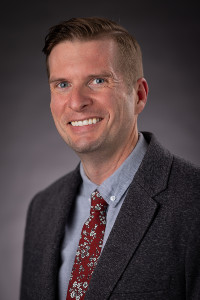
David Lawrimore- On Sabbatical during the Fall 2025 semester
Associate Professor of English
Office: LA 233
RESEARCH AREAS
American literature
English education
EDUCATION
PhD, English (2015), University of Florida
MA, English (2010), University of Florida
BA, English (2005), University of North Carolina at Chapel Hill
My research investigates the relationship between various literary forms and political ideologies in early and nineteenth-century American literature. My primary focus is the American novel before 1820, especially its publication and circulation history, its multiple points of connection to other genres, and its role in the class and partisan conflicts of the early national period. I have a secondary focus in abolitionist ideology and its influence on a variety of popular nineteenth-century subgenres, including African American autobiography and temperance narratives. My other main interests include critical theory, history of the book, race and empire studies, gender studies, and secondary English education. I am currently revising my book manuscript The Natural Aristocracy: The Early American Novelist as Intellectual for publication by an academic press. The first book-length study of the early American novel’s crucial role in the volatile class and partisan conflicts of the early national period, The Natural Aristocracy reads canonical and non-canonical novels in tandem with writings in other genres to illuminate the political and social conservatism of much early US literature.
My teaching investigates similar dynamics in early and nineteenth-century American literature, and my courses often problematize accepted traditions, ranging from literary canons, such as the American Renaissance, to social formations, such as industrial capitalism. I began my teaching career in 2006 as a high school English teacher. Since then, first as a graduate instructor at the University of Florida and now as a professor at Idaho State University, I have designed over twenty and taught over thirty undergraduate and graduate courses in literature, composition, and secondary education. I have tutored student athletes, sat on committees for M.A. and Ph.D. theses, and chaired Ph.D. dissertations. I am also committed to “teaching teachers,” and I have both mentored student teachers and taught courses in English pedagogy.
Publications
Select Journal Articles and Book Chapters
“Canonization and Its Discontents: Narrative of the Life in the Context of Douglass’s Intellectual Development" in Critical Insights: Frederick Douglass, edited by Jericho Williams. Ipswitch: Salem Press. Forthcoming Fall 2020.
“Temperance, Abolition, and Genre Collision in Whitman’s Franklin Evans.” Studies in American Fiction 44.2 (2017): 185-209.
“The Novelist as Intellectual: William Hill Brown’s The Power of Sympathy, Reconsidered.” American Literature 88.4 (2016): 695-722.
“Conflict Management: Jeremy Belknap’s Committed Literature.” Early American Literature 50.2 (2015): 359-384.
Select Reviews and Review Essays
“Network, Book, Page: Compacting Early American Book History.” Early American Literature. 55.3 (2020): 801-819.
Review of Surveyors of Customs: American Literature As Cultural Analysis. Studies in the Novel, by Joel Pfister. Studies in the Novel.
Select Web-Based Publications
“Desire and Didacticism in Ira & Isabella.” Just Teach One Web: January 2019. 900 words.
“Rosa and the Role of Female Education in the Early Republic.” Just Teach One Web: January 2018. 900 words.
“Teaching Collaborative Authorship with The Female Review.” Just Teach One Web: August 2017. 900 words.
“Genre, Format, and Nosebleeds, Reconsidered.” Common-Place: Just Teach One. Web: May 2016. 900 words.
“All of the Didacticism, None of the Scandal: Questioning the Canon with The Factory Girl.” Common-Place: Just Teach One. Web: August 2014. 900 words.
Courses Taught
ENGL 6625: Studies in a Literary Period: "Digital Archives and the Early American Novel"
ENGL 6621: Seminar in a Major Literary Genre: "Antebellum Slave Narratives"
ENGL 6621: Seminar in a Major Literary Genre: "American Novels Before 'The Novel'"
ENGL 6612: Introduction to Graduate Studies in English
ENGL 4466/5566: Studies in Early Nineteenth-Century Literature: "The Writer as Activist"
ENGL 4465/5565: Studies in Eighteenth-Century Literature: "Origins of the American Novel"
ENGL 4433: Methods of English Education
ENGL 3327: Special Topics in Genre: "Antebellum Slave Narratives"
ENGL 3311: Literary Criticism and Theory
ENGL 2278: Survey of American Literature II: 1860 to the Present
ENGL 2277: Survey of American Literature I: Contact to 1860
ENGL 2211: Introduction to Literary Analysis
ENGL 1175: Literature and Ideas: "Cultures of Capitalism"
ENGL 1102: Writing and Rhetoric II
HONS 1102: Honors Humanities II: "Coming-of-Age Narratives"
.jpg)
Matthew Levay
Professor of English; CAL Faculty Research Development Fellow
Office: LA 239
RESEARCH AREAS
Modernism
Comics studies
Periodical studies
EDUCATION
PhD, English (2009), University of Washington
MA, English (2004), University of Washington
BA, English (2002), Vanderbilt University
My research and teaching focus on twentieth-century literature and culture, with special emphasis on the relationship between modernism and popular forms. My work examines how a variety of figures–from novelists and magazine editors to cartoonists and filmmakers–in blending modernism’s experimental aesthetics with the conventions of popular culture, came to shape the broader media landscape of the early twentieth century in ways we are only beginning to recognize.
My first book, Violent Minds: Modernism and the Criminal (Cambridge University Press, 2019), constructs a genealogy of criminality in modernist fiction in England and America from the late nineteenth century to the 1950s, examining a range of modernist authors who explored new modes of psychological representation through the figure of the criminal, and who drew upon works of crime and detective fiction in order to develop those representations. My second book, The New Old Style: Anachronism in Contemporary Comics (forthcoming in 2026 with the University of Nebraska Press, in their Encapsulations: Critical Comics Studies series), asks why so many recent cartoonists adopt the styles of early twentieth-century popular visual culture, producing work meant to appear much older than it actually is. I’m currently at work on a new book project, “Time and Again: Modernism and the Form of the Series,” which examines the underappreciated yet pivotal role of serial forms—including novel series, magazines, film serials, and newspaper comics--in shaping modernist aesthetics.
I also have an abiding interest in scholarly editing; I am the Co-Editor, with Elizabeth Sheehan, of the Journal of Modern Periodical Studies (Penn State University Press), and I am editing the Cambridge Companion to American Comics (Cambridge University Press) while also preparing a scholarly edition of Wyndham Lewis’s jointly-published novels The Human Age: Monstre Gai and Malign Fiesta for Oxford University Press’s Collected Works of Wyndham Lewis.
Finally, I am committed to scholarly collaboration. I serve as the Faculty Research Development Fellow for the College of Arts and Letters, where I support College faculty as they develop their research agendas and apply for internal and external funding opportunities. If you’re a CAL faculty member working on a new project, at any stage, let’s talk!
*Complete CV available online at matthewlevay.com
Selected Honors and Awards
Franklin Research Grant, American Philosophical Society, Summer 2025.
Outstanding Faculty Advisor Award, Advising Community at Idaho State, 2025.
Fulbright US Scholar Award, Distinguished Chair in Humanities and Social Sciences, American Studies Center, University of Warsaw, Poland, Spring 2022.
Idaho State University Outstanding Master Teacher Award, 2021.
Modernist Studies Association Research Travel Grant, Winter 2019.
Idaho Humanities Council Research Fellowship, Spring 2016.
Harvard University Certificate of Teaching Excellence (six-time recipient 2010-2013).
Harry Ransom Center Research Fellowship, University of Texas at Austin, Summer 2011. Awarded through the Erle Stanley Gardner Endowment for Mystery Studies.
Books
The New Old Style: Anachronism in Contemporary Comics (University of Nebraska Press, forthcoming in August 2026).
Violent Minds: Modernism and the Criminal (Cambridge University Press, 2019).
Edited Volumes and Journal Issues
The Cambridge Companion to American Comics (Cambridge University Press, in process).
Monstre Gai and Malign Fiesta: The Human Age, Books Two and Three (Oxford University Press, Collected Works of Wyndham Lewis, under contract).
“Modernism in Comics,” essay cluster for Modernism/modernity Print Plus 9, cycle 3 (May 2025).
“Comics in 21st-Century American Life,” co-edited special issue of the New Americanist 2, no. 1 (May 2023).
“Seriality,” special issue of the Journal of Modern Periodical Studies 9, no. 1 (2018).
Recent Articles and Book Chapters
“Highsmith’s Advice: Suspense, How-To, and the Limitations of Genre,” New Literary History (forthcoming).
“Vintage Seth: Comics against Nostalgia,” Modernism/modernity Print Plus 9, cycle 3 (May 2025).
“Little Tommy Lost and the Anachronistic Comic,” in Comics and Modernism: History, Form, and Culture, ed. Jonathan Najarian (University Press of Mississippi, 2024), 284-300.
“Crime Fiction and Criminology,” in The Routledge Companion to Crime Fiction, ed. Janice M. Allan, Jesper Gulddal, Stewart King, and Andrew Pepper (Routledge, 2020), 273-281.
“Modernism’s Opposite: John Galsworthy and the Novel Series,” Modernism/modernity 26, no. 3 (September 2019): 543-562.
“On the Uses of Seriality for Modern Periodical Studies: An Introduction,” Journal of Modern Periodical Studies 9, no. 1 (2018): v-xix.
“Repetition, Recapitulation, Routine: Dick Tracy and the Temporality of Daily Newspaper Comics,” Journal of Modern Periodical Studies 9, no. 1 (2018): 101-122.
“Preservation and Promotion: Ellery Queen, Magazine Publishing, and the Marketing of Detective Fiction,” in The Centrality of Crime Fiction in American Literary Culture, ed. Alfred Bendixen and Olivia Carr Edenfield (Routledge, 2017), 101-122.
Courses Taught
6635: Graduate Seminar in Teaching ("Teaching Comics")
6632: Graduate Seminar in Teaching Literature (“Teaching Difficult Literature”)
6625: Graduate Seminar in a Literary Period (Modernism)
6612: Introduction to Graduate Studies in English
6610: Careers in English
4473/5573: Major Authors (James Joyce's Ulysses)
4469/5569: Twenty-First-Century Literature
4468/5568: Twentieth-Century Literature
3327: Special Topics in Genre: Comics
3323: Studies in Fiction (“How Novels Work”)
3311: Literary Criticism and Theory
3305: The Art of Film II (“The Art of Animation”)
2268: Survey of British Literature II
2211: Introduction to Literary Analysis
1126: The Art of Film I
1102: Writing and Rhetoric II
HONS 3391: Honors Seminar ("What Comics Can Do")
HONS 1102: Honors Humanities II
HONS 1101: Honors Humanities I
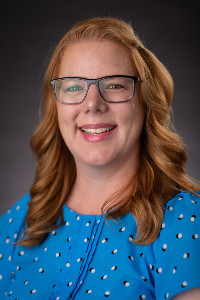
Corinna Percy
Assistant Lecturer in English
Office: LA 207-C
RESEARCH AREAS
Ethnic American literature
Gender and sexuality studies
War literature
Education
PhD, English and the Teaching of English (2019), Idaho State University
MA, English (2014), Idaho State University
MPS, Publishing (2009), George Washington University
BA, English (2007), Brigham Young University-Idaho
I earned my MA and PhD in English from Idaho State University. My dissertation examined the history and literature of the World War II era that depicts the lives of marginalized soldiers and discussed how these soldiers created their own forms of masculinity that adapted, resisted, or repackaged it differently from the privileged, white concept in America. My past teaching experiences include courses such as Rhetoric and Writing I and II, Ethnic American Literature, and Gender in Literature. My courses focus on critical reading and thinking, particularly addressing the intersections of history, race, ethnicity, gender, sexuality, and the hierarchies of power associated with social constructs.
As an instructor, I aim to help students develop confidence in their own critical reading, thinking, and writing skills. In composition classes, I like to draw on students’ own experiences as sources for conversation, writing, and research and encourage them to see each step of the writing process as a dynamic way to develop their own ideas and express their individual strengths.
Publications
“‘I Hear You Just Fine’: Disability and Queer Identity in Yuki Fumino’s I Hear the Sunspot.” The Journal of Anime and Manga Studies. Vol. 1, 2020, pp. 35-75.
“A Hair Closer to Freedom: Retellings of Rapunzel as Self-Rescuer.” The ALAN Review, vol. 45, no. 3, Summer 2018, pp. 72-81.
“Reformers, Racism, and Patriarchy in Maria Amparo Ruiz de Burton’s The Squatter and the Don.” The Explicator, vol. 75, no. 2, 2017, pp. 112-117.
Courses Taught
3308: Business Communications
1175: Introduction to Literature
1102: Writing and Rhetoric II
1101: Writing and Rhetoric I
1100: Academic Speaking and Writing for International Students

Abraham Romney
Associate Professor of English
Office: LA 225
RESEARCH AREAS
Comparative and cultrual rhetorics of the Americas
Visual, sonic, and multimodal rhetorics
Multilingual and AI-enhanced writing pedagogies
EDUCATION
2013, Ph.D., University of California-Irvine, Department of Comparative Literature
2008, MA, University of California-Irvine, Department of Comparative Literature
2007, MA, University of Oregon, Department of English
2005, BA, Brigham Young University-Idaho, English with a minor in Spanish
I study histories and theories of rhetoric, with a few different research areas, including 19th century rhetoric in Latin America and contemporary approaches to rhetoric and the teaching of writing. Before coming to ISU, I worked at Michigan Technological University as the Director of their Composition Program and an Associate Professor of Rhetoric and Composition. Prior to directing composition, I was director of the Michigan Tech Multiliteracies Center. I am delighted to be back closer to my roots in Idaho and look forward to continuing my work at Idaho State University.
Awards/Honors
“Human-Centered Engineering Initiative.” Co-PIs: Mary Raber, Oren Abeles, Nancy Barr, and Marika Seigel. National Endowment for the Humanities Connections Planning Grant. 2019.
Research Enhancement Fund Scholarship and Creativity Grant, Michigan Technological University. 2016.
Research Fellowship, International Society for the History of Rhetoric. 2014.
William G. Jackson Center for Teaching and Learning Blended Learning Grant Program, Michigan Technological University. 2014-2015.
Selected Publications
Hamlin, Brett and AJ Hamlin, Tori Claudette Reeder, Josh Chase, Mary Raber, Laura Vidal-Chiesa, Modupe Omolara Yusuf, Abraham Romney, Marika Seigel. “Work-In-Progress: Leveraging Interdisciplinary Topics in First-year Engineering” 2021 ASEE Virtual Annual Conference & Exposition, July 26-29, 2021
Romney, Abraham “A Comparative Cultural Rhetorics Approach to Indigenous Rhetorics in the Americas.” Routledge Handbook of Comparative World Rhetorics. Ed. Keith Lloyd. Routledge, 2021.
Romney, Abraham. “Spectacular Crisis: Rhetorics of Representation in Venezuela.” Rhetorics of Democracy in the Americas. Eds. Adriana Angel, Nancy Gómez, and Michael L. Butterworth, Penn State Press, 2021.
Romney, Abraham. “Affective Witnessing in the Visual Documentation of Suffering” Symposium on Global Contexts for Rhetorical Witnessing. Rhetoric Review. 30.4(2020): 369-442.
Seigel, Marika and Joshua Chase, Silke Feltz, William DeHerder, Karla Kitalong, Abraham Romney, and Kimberly Tweedale. “Monstrous Composition: Reanimating the Lecture in First-Year Writing Instruction.” College Composition and Communication (forthcoming June 2020).
Courses Taught
ENGL 4407: Topics in Professional Writing [perhaps indicate topic]
ENGL 3307: Technical and Professional Writing
ENGL 1101: Writing and Rhetoric I

Roger Schmidt
Professor of English
Office: LA 271
RESEARCH AREAS
Jane Austen
William Hogarth
Writing technologies and the history of the book
EDUCATION
PhD, English (1989), University of Washington
MA, English (1985), University of Washington
BA, English (1980), University of Washington
My primary specialty is Eighteenth-century British literature. I enjoy the poetry of Pope, Johnson’s Rambler essays and Boswell’s Life of Johnson, Hogarth’s prints, eighteenth-century typography, the history of manners, and the history of medicine. Beyond the eighteenth century, I enjoy literature in translation, particularly Japanese and Russian; the study of writing technologies, especially calligraphy, letterpress, and the history of the book; and film studies, with an emphasis on film history.
My interest in the study of writing technologies has led to studying eighteenth-century books at the Library of Congress in Washington, D.C. as part of Rare Book School; to a residence at Chawton House Library in England as a Research Fellow where I lived in the Old Stables and taught myself to “forge” Jane Austen’s handwriting; to teaching students to write with dip-pens and quills; to developing the VisCom Experimental Print Lab in collaboration with Paula Jull from the Department of Communication, Media and Persuasion where students can work with traditional hand-crank letterpresses; to being a founding board member of the Pinyon Jay Press; and to establishing at Oboler Library the Samuel Johnson and his Circle collection of rare books and prints housed in Special Collections. Each semester I have my students, from first-year to graduates, work with this collection, particularly the rare prints. Among these prints are William Hogarth’s Marriage a la Mode (1745), a current focus of my research into the history of medicine.
In addition to developing the Samuel Johnson and his Circle Rare Book Collection, I helped create the interdisciplinary Film Studies Minor that is housed in the Department of English and Philosophy. My main interest is in film history, particularly film noir. I am excited at the forthcoming development and expansion of this program.
I am delighted to work with graduate students on eighteenth-century topics. That said, I have directed a wide range of Master Theses, Doctoral Papers, and PhD Dissertations, over such authors as Shakespeare, Sterne, Austen, Emily Bronte, Hawthorne, Chopin, H.H. Brackenridge and Philip Freneau, and the Japanese writer, Koda Rohan; on subjects such as the Ballets Russes’ 1912 production of Daphnis and Chloe, Humanist Pedagogy, the rhetoric of medical case studies, and using eighteenth-century poetry in first-year composition classes; I have also directed MA creative theses in poetry, short fiction, creative non-fiction (memoir), and a graphic novel.
Awards/Honors
Rare Book School (University of Virginia): The Eighteenth-Century Book, Library of Congress, Washington D.C., July 2017
“To What Shall I Compare this Life?” An essay listed in “Notable Essays and Literary Nonfiction of 2014,” Best American Essays 2015. Editor Robert Atwan
Chawton House Library Fellow, in conjunction with University of Southampton, UK, 2013
Idaho Humanities Council Grant, 2012
American Society of Eighteenth-century Studies 2011 Innovative Course Design Award
Distinguished Teacher, ISU, 2011
Master Teacher, ISU, 1995
Selected Publications
“Wasted Days and Wasted Nights: Sleeping and Waking in the Eighteenth-Century” In Lifestyle and Medicine in the Enlightenment. Routledge. (August 2020)
“To What Shall I Compare This Life,” (essay) Raritan (Spring 2014) 95-106.
“A Literary History of Teeth,” Raritan (Winter 2010) 23-42.
Water & Mountain: Two Tales by Koda Rohan; translated by Tsutomu Naga and Roger Schmidt Rendezvous (Vol. 40, No. 1) 2009.
“Thirteen Ways of Looking at a Blackboard.” Raritan (Winter 2006, Vol. XXV, No. 3) 47-69.
“Kant’s Last Cup.” Chapbook. Pocatello, ID: Blue Scarab Press, 2006.
“A Trip to Maldon,” in Pilgrims and Natives. Rendezvous (Fall 2005, Vol. 38, No. 2) 59-62.
“Caffeine and the Coming of the Enlightenment,” Raritan (Spring 2003, Vol. XXIII, No. 1) 129-149.
The Manufacture of Glass: Essays. Rendezvous (Spring 2001, Vol. 35, No. 2)
Courses Taught
6631: Seminar in Teaching Writing
6627: Seminar in Major Literary Figure (Jane Austen, Samuel Johnson)
4499/5599: History of Writing Technologies; Calligraphy
4491: Senior Seminar (Forging Jane Austen)
4477/5577: Shakespeare in Performance
4472/5572: Proseminar in Major Literary Figure (Samuel Johnson, Jane Austen, Chekhov and Tolstoy; Arthur Conan Doyle)
4465/5565: Eighteenth-Century Literature
4456/5556: Comparative Literature: Russian Literature; Japanese Literature
3324: Genre Studies in Non-Fiction
3305: Art of Film II (Film Noir; The Films of Alfred Hitchcock)
2267/2268: British Literature I & II
2257/2258: World Literature I & II
1126: Art of Film I
1115: Major Themes in Literature: Russian Literature
All levels of Composition
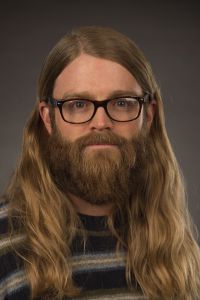
Michael Stubbs
Senior Lecturer in English
Office: LA 157
RESEARCH AREAS
Nature and literature
American literature
World mythology
EDUCATION
DA, English (2008), Idaho State University
MA, English (2005), University of Alaska, Fairbanks
BA, English (2002), Brigham Young University
I find it funny to be living and teaching in Pocatello, Idaho. I was raised nearby in Twin Falls, and one time swore to leave behind small town life, sagebrush, and deserts forever because, from the beginning, I loved the study of literature for its vision of far off lands, foreign cultures, new ideas, and adventures. So I left home and read about ancient Greeks, Romans, Vikings, philosophers, adventurers, and scholars. I was never disappointed. The study of literature was exciting, challenging, and never-ending.
As I read, I wanted to develop my own ability to write just as well, so as an undergraduate student, I took as many writing classes as I did literature classes. Learning to write well was not easy, but that is what made it worthwhile. Because I had to work hard in order to improve as a reader and a writer, today I make my students work hard to ensure their improvement. When I finished my undergraduate studies, I didn't know what I wanted to be doing beside reading and writing, and so I kept going to school after I finished my bachelor's degree.
In the master's program at the University of Alaska, Fairbanks, I was introduced to a new set of writers — nature writers, or environmental writers. These people showed me that reading and writing about what is familiar, reading and writing about home, can be just as intriguing as those far off places. This led me to look closer to home to continue my study of English. At Idaho State University, I continued to study literature and environment. In the doctor of arts program, I was able to add the interdisciplinary subjects of politics and history to my study of nature and art. Discussions about the history, the politics, and the artistic representations of place are continually fascinating to me, and I encourage the students in my composition courses and in my literature courses to reconsider their views of nature and place as they discover new ways of reading and writing. I am happy to call Idaho "home," and I am happy to teach the ways of reading, writing, and thinking that have shown me new ways of understanding.
Selected Publications
“Climbing Heybum.” Idaho Magazine, August 2018. 6-13.
“The Bear and the Bell.” Idaho Magazine, December 2017. 12-18.
“Along with Tom: Hiking the Idaho Centennial Trail.” Idaho Magazine, October 2016. 18-23.
“Ultra-Run: sixty seven miles, one step at a time.” Idaho Magazine, October 2015. 49-53.
“Chasing Winter.” Idaho Magazine, May 2015. 42-45.
"Or Not to Ski." The Idaho Magazine, August 2014.
"In the Mountains, No One Can Hear You Swear." Sunstone Magazine, September 2012.
"Haiku" (poem). Rock and Ice Magazine, March 2012.
"Staying at Home in a Daddly Fashion." Sunstone Magazine, 163 June 2011.
"House Dad," "Snow" (poems). Red Clay Review, Spring 2007.
"Lichens," "I Spilled My Blood," "The Hermit's Cave" (poems). Black Rock and Sage, Spring 2007. 17, 18.
"One the Road to Anchorage, September," "Walking Home on a Dark Street in Guadalajara, Mexico" (poems). Ice Box, 6 Spring 2004. 51, 53, 62.
Awards and Honors
Master Teacher Award, ISU, 2018
Courses Taught
2277: Survey of American Literature I
2258: Survey of World Literature II
2257: Survey of World Literature I
1175: Literature and Ideas
1115: Special Topics in Literature: Nature
1102: Writing and Rhetoric II
1101: Writing and Rhetoric I
.jpg)
Matthew VanWinkle
Associate Professor of English
Office: LA 226
RESEARCH AREAS
British romantic and Victorian poetry
Gothic fiction
Neo-Victorian narratives
EDUCATION
PhD, English (2006), Boston College
MA, English (1998), Boston College
BA, English (1995), Boston University
As his long elegy for his friend Hallam draws to a close, Tennyson reflects both on his strengthening appreciation for their altered bond, and on the limits of that appreciation: “Strange friend, past, present, and to be; / Loved deeplier, darklier understood.” These lines read vividly, poignantly, in themselves; they also speak to something daunting but vital about working on literature from an increasingly distant historical moment. In pursuing my work on nineteenth-century British poems and fictions, I often feel my admiration of them deepen, feel that I am coming to know something of them that an initial glance cannot fully recognize or appreciate. At the same time, however, I feel that this understanding remains at least partially in the shadows, and that to acknowledge the incompleteness of even the most acute insight is to pay an indispensable respect to a difference I might otherwise be tempted to remake into a resemblance.
Tennyson’s evocative lines also provide a model for how I have recently begun thinking about neo-Victorian fictions: late twentieth and early twenty-first century narratives set in the Victorian era, exploring a kind of self-reflexive historicity involved in the construction or reconstruction the Victorian past. Do we imagine the Victorians imagining the past in the same ways that we imagine them as the past? Or have the dynamics of historical recollection changed between their era and ours? One strand of my recent work considers the implications of both the points of contact and points of departure that the answers to these interrelated questions might provide.
Selected Publications
"'Is the Language Not Rich with Felicity of Expression?': Penny Dreadful, Romantic Poetry, and the Limits of the Neo-Victorian," Filming the Past, Screening the Present: Neo-Victorian Adaptations, edited by Shannon Wells-Lassagne and Eckart Voigts, Trier: Wissenschaftlicher Verlag Trier, 2021, pp. 155-168.
"Kept in the Dark: Poetry, Collaboration, and Collapse in Pandaemonium and Tom and Viv," New Ohio Review 26 (2019), 160-164.
"Christina Rossetti's 'By Way of Remembrance': Address, Intertextuality, and Abiding Self-Scrutiny." Victorian Poetry vol. 58, no. 1, Spring 2018, pp. 59-80.
"'That Smileless Mouth of Him': Humor and the Malice of Delay in Dracula." The Journal of Dracula Studies, no. 19, 2017, pp. 91-110.
"Tennyson's 'Tithonus' and the Exhaustion of Survival in The X-Files." The X-Files and Literature: Unweaving the Story, Unraveling the Lie to Find the Truth. Ed. Sharon R. Yang. Newcastle upon Tyne, England: Cambridge Scholars, 2007. 298-311.
"Fluttering on the Grate: Revision in 'Frost at Midnight.'" Studies in Romanticism, 43 (2004): 583-98.
"Mocking Stupendous Mechanisms: Romantic Parody and Frankenstein's Dream." Frankenstein's Dream. Ed. Jerrold E. Hogle. College Park, MD: U of Maryland; 2003.
Awards/Honors
ISU Master Teacher Award, 2020
Courses Taught
6625: Seminar in a Literary Period
4491: Senior Seminar in Literature
4467/5567: Studies in Late 19th-Century Literature
4466/5566: Studies in Early 19th-Century Literature
3311: Writing and Research about Literature
2268: Survey of British Literature II
2267: Survey of British Literature I
2211: Introduction to Literary Analysis
1102: Writing and Rhetoric II
1101: Writing and Rhetoric I
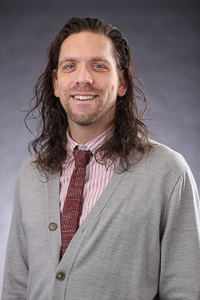
Robert Watkins
Associate Professor of English
Office: LA 155
RESEARCH AREAS
Rhetoric, composition pedagogy, and technical communication theories
Multimodality and adjacent theories
EDUCATION
PhD, Rhetoric & Professional Communication (2014), Iowa State University
MA, English - Literature & Writing (2008), Utah State University
BA, English - Professional & Technical Writing (2005), Utah State University
Robert Watkins studied rhetoric, composition, and technical communication at Iowa State and Utah State. He teaches those very subjects to undergraduate and graduate students at Idaho State. His teaching approaches stem from his research, where he focuses on the pedagogical intersections of multimodal composition, visual rhetoric, technical communication, and comics production. The vesica piscis of these topics appear in all his classes: teaching rhetorical genre and comics production to model all types of professional and academic writing. Rob loves working with students to help them find their professional and academic voice. Feel free to contact him if you’d like to discuss any of these topics.
Publications
Peer Reviewed
"Technical and Sequential: Teaching Comics Production in the Technical Communication Classroom.” Programmatic Perspectives, vol. 11, no. 1, 2020, pp. 40–67.
"Sequential Mapping: Using Sequential Rhetoric and Comics Production to Understand UX Design.” Technical Communication Quarterly, vol. 29, no. 3, 2020, pp. 304–318. (with Tom Lindsley)
“iPads or Computer Labs: A Technical Communication Classroom Study.” E-Learning and Digital Media, Sage Publishing. Vol. 16 , Issue 5, September 2019. (with Diantha Smith Mark McBeth).
“Comic Con(nection): Envisaging Comics as a Multimodal Ensemble that Teaches Core Visual Writing." Journal of Teaching Writing, Vol. 33, No. 2, 2018.
“Sequential Rhetoric: Using Freire and Quintilian to Teach Students to Read and Create Comics.” Digital Humanities Quarterly. Spring 2016. Winner of Best Online Comics Scholarship 2016 (with Tom Lindsley).
"Sexy Art, Speculative Commerce, and the X-Men #1 Launch Extravaganza." The Ages of X-Men. ed. Joseph Darowski. McFarland: Jefferson, 2013. (with Tim Elliot).
"Words Are The Ultimate Abstraction: Towards Using Scott McCloud for Teaching Visual Rhetoric." Kairos. Kairos and Creative Commons, online, Summer 2008.
Reviews, Fiction, & Pop Culture
“The Little Girl and the Universe Tool.” Baltimore Review. Winter 2019.
“Chasing the Light: The Cloud Cult Story.” Popular Music and Society, vol. 40, no. 1, January 2017.
“Stewart/Colbert Effect: Colbert Trumps Fallon in Trump Interview.” Pop Matters. March 2016.
"The Blueprint/Product Disparity: Learning from Lofty Plans and Humble Products." InVisible Culture vol. 23, 2015.
Courses Taught
English 7731: Practicum in Teaching Composition
English 6631: Seminar in Teaching Writing
English 4499/5599: Advanced Academic Writing
English 4493: Senior Seminar Professional Writing
English 4431/5531: Teaching and Writing Projects Special Topics
English 4410: Writing Internship
English 4407: Topics in Professional Writing
English 4401/5501: Advanced Composition
English 3308: Business Communication
English 3307: Technical Communication
English 1102: Writing and Rhetoric II
English 1101: Writing and Rhetoric I

Curtis Whitaker- On Sabbatical during the 2025-2026 academic year
Professor of English
Office: LA 258-C
RESEARCH AREAS
Seventeenth-century (late-Renaissance) literature and history
Literature and the environment
EDUCATION
PhD, English (2001), University of California, Los Angeles
MA, English (1997), University of California, Los Angeles
California Teaching Credential in English (1988), University of California, Davis
BA, English and German (1986), University of California, Davis
Curt Whitaker has taught Renaissance literature for the Department since his arrival in 2001. His research focuses on pre-industrial representations of nature--e.g., gardens, agriculture, water, medicinals--in seventeenth-century poetry, especially that of George Herbert and Andrew Marvell. He received ISU's Master Teacher Award in 2007 and 2015 and sits on the local boards of the Portneuf Valley Audubon Society and the Pinyon Jay Press.
Additional interests: aesthetics, cognitive theory, translation theory, religion and literature, pedagogy.
Publications
“Herbert, Family, and the Choice of Plainness.” George Herbert Journal 44 (2023): 45-62.
"Marvell on Renaissance Translation Practice," 2019, Studies in English Literature.
"Domesticating and Foreignizing the Sublime: Paradise Lost in German," 2017, Milton in Translation, ed. Angelica Duran, Islam Issa, and Jonathan Olson (Oxford: Oxford University Press).
"Bioaesthetics and the American West," 2014, Found in Alberta: Environmental Themes for the Anthropocene, ed. Robert Boschman and Mario Trono (Waterloo, Ontario: Wilfrid Laurier University Press).
"Fairfax, Marvell, and the Mowers of Nun Appleton," 2013, Ben Jonson Journal.
"German Translations of Paradise Lost," 2012, Yale Milton Encyclopedia.
"Andrew Marvell, Man Without Qualities," 2011, Essay Review, Huntington Library Quarterly.
"Herbert's Pastor as Herbalist," 2010, George Herbert's Pastoral: New Essays on the Poet and Priest of Bemerton, ed. Christopher Hodgkins (Newark: University of Delaware Press).
"Baptisms and Burials: The Presence of the Prayer Book in Herbert's Nature Poetry," 2006, George Herbert Journal.
"Seventeenth-Century Teeth," 2003, Rendezvous.
"Andrew Marvell's Garden-Variety Debates," 1999, Huntington Library Quarterly.
Awards/Honors
Master Teacher, ISU, 2007 and 2015
Courses Taught
6632: Seminar in Teaching Literature
6625: Seminar in a Literary Period
4474/5574: Milton
4464/5564: Studies in 17th-Century Literature
4463/5563: Renaissance Literature
4461/5561: Studies in Classical Literature
3341: Bible as Literature
3322: Genre Studies in Poetry
3311: Writing and Research about Literature
1115: Literature and the Environment
1102: Writing and Rhetoric II
1101: Writing and Rhetoric I
Classical (Greek and Roman) Literature
Pedagogy
Science and Religion in Literature

Jessica Winston
Professor of English
Office: LA 158
RESEARCH AREAS
Renaissance literature
Drama in performance
Law and literature
EDUCATION
PhD, English (2002), University of California, Santa Barbara
MA, English (1996), University of California, Santa Barbara
BA, English (1994), Wellesley College
My expertise lies in early modern literature and culture (c. 1485-1642), with a specialization in early modern drama and allied expertise in poetry. My research aims to reframe critical understandings of Tudor literature, a period long neglected by scholars, who viewed it as “drab” as compared to a Shakespearean “golden age” (to use C.S. Lewis’s enduring terms). In the past decade, critics have sought to revive interest in this literature, showing that it contributed in significant ways to the period’s major cultural transformations. My first book, Lawyers at Play, advanced this work, examining how the the literary culture of the Inns of Court responded to and shaped transformations in the English legal profession in the 1560s. My new book project “Tudor Drama in Modern Performance, 1890–present” aims to further reframe Tudor studies by showing how modern productions have reinforced older critical notions of Tudor literature, even as they have demonstrated the plays’ continuing significance.
I teach courses in Shakespeare, early modern drama, and Renaissance literature, as well as lower-division, general education, and required major courses in writing and literary analysis.
Complete CV available online at: academia.edu.
Books
Lawyers at Play: Literature, Law, and Politics at the Early Modern Inns of Court, 1558-1581 (Oxford: Oxford University Press, 2016). Awarded Joseph L. Andrews Legal Literature Award, 2017, American Association of Law Libraries
Elizabethan Seneca: Three Tragedies (co-edited with James Ker), MHRA Tudor and Stuart Translations Series, vol. 8 (London: Modern Humanities Research Association, 2012). 340pp.
Selected Articles and Book Chapters
"Acting Like a Lawyer: Mooting, The Misfortunes of Arthur, and Legal Professional Identity,” Mapping the Early Modern Inns of Court: Writing Communities, edited by Emma Rhatigan and Jackie Watson, Palgrave, 2025, pp. 19-37.
“Live on Film! Recent Trends in Research and Teaching with Mediated Theatre.” The CEA Forum 49.2 summer/fall 2023: 179–205.
“Gorboduc Now! The First English Tragedy in Modern Print and Performance.” English: Journal of the English Association, special issue on “Territory, Politics, and Performance in Early Modern England,” edited by Paul Frazier and Harriet Archer, 68:261 (2019): 184-203.
“From Discontent to Disdain: Thomas Lodge’s Scillaes Metamorphosis and the Inns of Court,” Elizabethan Narrative Poems: The State of Play, ed. Lynn Enterline, Arden Shakespeare – State of Play Series. London: Bloomsbury, 2019. 143–166.
“Situated Interpretation: Teaching Shakespeare with Live Performance.” The CEA Forum 48:1 (2019), 290–333.
"Digital Resources for Performance History: Online Newspaper Archives and Modern Productions of Gorboduc" in Early Modern Literary Studies 20:1 (2018). 2200 words. Web.
"Legal Satire and the Legal Profession in the 1590s: John Davies's Epigrammes and Professional Decorum." Oxford Handbook to English Law and Literature, 1500-1700, ed. Lorna Hutson. Oxford: Oxford University Press, 2017. 121-141.
"Rethinking Absolutism: English de casibus Tragedy in the 1560s," A Mirror for Magistrates in Context: Literature, History and Politics before the Age of Shakespeare, ed. Harriet Archer and Andrew Hadfield. Cambridge: Cambridge University Press, 2016. 199-215.
"Early 'English Seneca': From 'Coterie' Translations to the Popular Stage," Brill's Companion to the Reception of Senecan Tragedy: Scholarly, Theatrical, and Literary Receptions, ed. Eric Dodson-Robinson. Leiden: Brill, 2016. 174-202.
"A Note on Jasper Heywood's 'Free Compositions' in Troas (1559)" (co-authored with James Ker). Modern Philology 101:4 (2013), 564-75.
Awards/Honors
Huntington Library Travel Grant, 2018
Joseph L. Andrews Legal Literature Award, American Association of Law Libraries, 2017
Outstanding Researcher Award, ISU, 2017, 2018
Fellowship, National Endowment for the Humanities, 2011-12
Master Teacher, ISU, 2007, 2010
Research Fellowship, Idaho Humanities Council, spring 2009
Mellon Sawyer Seminar Postdoctoral Fellowship, University of Aberdeen, 2003-04
Courses Taught
Upper-Division / Graduate
Censorship and Renaissance Literature
Adaptations of Seneca in Renaissance Drama
Non-Shakespearean Renaissance drama
Teaching Shakespeare
Adaptations of Shakespeare, 1600-2000
Shakespeare in Performance
Shakespeare
Renaissance Literature - Women in Renaissance Literature
Classical Literature
Genre Studies in Drama - Survey of Tragedy
Lower-Division / General Education
Survey Early British Literature
Introduction to Literary Analysis
Honors Humanities I
Writing and Rhetoric II
Writing and Rhetoric I

Brent Wolter
Professor of English; Chair of the Department of English and Philosophy
Office: LA 263
RESEARCH AREAS
Second language acquisition
TESOL
EDUCATION
PhD, Applied Language Studies (2005), University of Wales at Swansea
MA, TESL/TEFL (1999), University of Birmingham
BA, English & Psychology (1991), Wartburg College, Waverly, Iowa
I am an applied linguist with an interest in second language acquisition, particularly vocabulary acquisition. I joined the faculty here at Idaho State University in 2005, where one of my main responsibilities is to collaborate on the establishment and implementation of the English department’s Graduate Certificate in TESL. The program is designed to serve both teachers in local communities, as well as teachers of English in foreign language environments.
Before coming to ISU, I taught English in Japan for more than a decade. Through this experience, I became interested in the field of applied linguistics partly due to my desire to improve myself as a teacher, and partly due to my curiosity about the social, psychological, and cognitive processes that lead to the successful acquisition of second languages. My research in the field especially reflects my concern with understanding how vocabulary acquisition and vocabulary use function at a psycholinguistic level.
I enjoy teaching both at the graduate and undergraduate levels. As a teacher, I particularly look forward to that moment where students realize that linguistics is actually a lively, engaging, and relevant area of study, even though it often has the false image of being the tedious process of cataloging the intricacies of language.
Selected Publications
Wolter, B. (2024). Approaches to vocabulary instruction from an input processing perspective. In J. Barcroft & W. Wong (Eds.), Handbook of SLA and Input Processing. Routledge.
Wang, H., Guo, H., Yang, L., & Wolter, B. (2023). A decade of research into second language acquisition: A state-of-the-science review (2009-2019). Chinese Journal of Applied Linguistics, 46(3), 386-403.
Wolter, B. (2023). Cross-language influences in the acquisition of L2 multiword expressions. In I. Elgort, A. Siyanova-Chanturia, & M. Brysbaert (Eds.), Cross-language Influences in Bilingual Processing and Second Language Acquisition (pp. 211–228). John Benjamins Publishing Company. https://benjamins.com/catalog/bpa.16
Pei, X., Yang, L., Chen, Y., & Wolter, B. (2022). Chinese EFL learners’ apology strategies: A multimodal perspective: Applied Pragmatics, 5(1), 64–85. https://doi.org/10.1075/ap.20021.pei
Wolter, B. (2022). Refining optimum levels of acquisition and L1 semantic influences in the Ontogenesis Model. Bilingualism: Language and Cognition, 25(2), 234–235. https://doi.org/10.1017/S1366728921000584 (invited by editor)
Wolter, B., Leung, C. Y., Wang, S., Chen, S., & Yamashita, J. (2022). Comparing linguistic and cultural explanations for visual search strategies. Cognitive Linguistics, 33(4), 623–657. https://doi.org/10.1515/cog-2020-0105 (peer reviewed)
Wolter, B., Yamashita, J., & Leung, C. Y. (2020). Conceptual transfer and lexical development in adjectives of space: Evidence from judgments, reaction times, and eye tracking. Applied Psycholinguistics, 41(3), 595-625.
Cui, Y., Yang, L., & Wolter, B. (2019). Alignment effect in the continuation task of Chinese low-intermediate English learners. Applied Linguistics Review. https://doi.org/10.1515/applirev-2019-0035
Wolter, B. (2019). Key issues in teaching multiword items. S. Webb (Ed.), Routledge handbook of vocabulary studies (pp. 493-510). New York: Routledge Publishers.
Wolter, B. & Yamashita, J. (2017). Word frequency, collocational frequency, L1 congruency, and proficiency in L2 collocational processing: What accounts for L2 performance? Studies in Second Language Acquisition.
Gyllstad, H. & Wolter B. (2016). Collocational processing in the light of a phraseological continuum model: Does semantic transparency matter? Language Learning, 66, 296-323.
Wolter, B. & Helms-Park, R. (2016). Lexical knowledge and processing in second language reading. In X. Chen Bumgardner, V. Dronjic,, & R. Helms-Park (Eds.). Second language reading: Psycholinguistic and cognitive perspectives (pp. 133-158). New York: Routledge Publishers.
Wolter, B. & Yamashita, J. (2015). Processing collocations in a second language: a case of first language activation? Applied Psycholinguistics, 36, 1193-1221.
Wolter, B. & Gyllstad, H. (2013). Frequency of input and L2 collocational processing: a comparison of congruent and incongruent collocations. Studies in Second Language Acquisition, 35, 451-482.
Zareva, A. & Wolter, B. (2012). The 'promise' of three methods of words association analysis to L2 lexical research. Second Language Research, 28, 41-67.
Wolter, B. & Gyllstad, H. (2011). Collocational links in the L2 mental lexicon and the influence of L1 intravesical knowledge. Applied Linguistics, 32, 430-449.
Wolter, B. (2009). Meaning-last vocabulary acquisition and collocational productivity. In T.Fitzpatrick & A. Barfield (Eds.), Lexical Processing in Second Language Learners (pp. 128-140). Clevedon: Multilingual Matters.
Wolter B. (2006). Lexical network structures and L2 vocabulary acquisition: the role of L1 lexical/conceptual knowledge. Applied Linguistics, 27, 741-747.
Wilks, C., Meara, P., & Wolter, B. (2005). A further note on simulating word association behavior in a second language. Second Language Research 21(4), 359-372.
--Reprinted in Connected Words by Paul Meara. Baltimore: John Benjamins (2009).
Meara, P. & Wolter, B. (2004). V_Links: beyond vocabulary depth. Angles on the English-speaking World, 4, 85-96.
--Reprinted in Connected Words by Paul Meara. Baltimore: John Benjamins (2009).
Wolter, B. (2002). Assessing proficiency through word associations: Is there still hope? System, 30, 315-329.
Wolter, B. (2001). Comparing the L1 and L2 mental lexicon: a depth of individual word knowledge model. Studies in Second Language Acquisition, 23, 41-69.
Wolter, B. (2000). A participant-centered approach to INSET course design. ELT Journal, 54, 311-318.
Awards/Honors
Master Teacher, ISU, 2010
Courses Taught
6682: Methods of Teaching English as a Second Language
6681: Theory of Second Language Acquisition
4485/5585: Linguistic Analysis
4484/5584: Rotating Topics in Linguistics
2281: Introduction to Language Studies
1102: Writing and Rhetoric II
1101: Writing and Rhetoric I
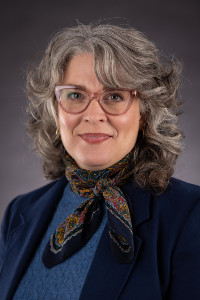
Amanda Zink
Professor of English
RESEARCH AREAS
North American indigenous literatures
Multi-ethnic literatures of the United States
Gender in literature
EDUCATION
PhD, English (2013), University of Illinois, Urbana-Champaign
MA, English (2005), University of Massachusetts, Boston
BA, English (2000), Olivet Nazarene University
My research and teaching focus on nineteenth to twenty-first century American literature. More particularly, my work focuses on American literature from the margins, written by Americans who, because of their gender, sexuality, race, ethnicity, or indigeneity, find themselves struggling even to be included in the American body politic. I also focus on literature from generic margins, writing and teaching about texts such as magazine stories, comics, and other ephemeral cultural texts alongside more traditionally "literary" novels, poems, short stories, and essays.
My first book emerging from these interests was published in 2018 by the University of New Mexico Press. Titled Fictions of Western American Domesticity: Indian, Mexican, and Anglo Women in Print Culture, 1850-1950, this book looks at the (literary) history of women's involvement in Westward Expansion. As white women found new freedoms during this period, American Indian and Mexican American women found themselves doubly colonized: by the federal projects and programs that took over more and more Western lands, but also by a newly-mobile force of white women who used their authority in the ideologies of American domesticity to force new ways of living and being upon them. At the same time, Indian and Mexican women also found ways into this domestic discourse, and their literature demonstrates sophisticated negotiations of the forces--both indigenous and federal--that would circumscribe their identities.
I have also begun work on a second book project, funded, in part, by a grant from the Idaho Humanities Council. The research for my first book shows that a) there are many, many texts written by Native American students during their years at federal Indian boarding schools and that b) these texts, though increasingly digitized, are scattered across the Internet and library archives. This second book, then, aims to gather some of these texts into an edited collection, an anthology of literature written by Native students at boarding schools in Idaho, Montana, Washington, and Oregon in the late-nineteenth and twentieth centuries. Such a book would provide easier access--for researchers and indigenous families--to a nearly forgotten canon of Native writing that is a rich site documenting the adaptation and survivance (to use Gerald Vizenor's term) of American Indians during the heyday of federal policies aimed at exterminating them.
My research in these areas necessarily informs my teaching. I am committed to helping students look for and listen to voices from the American margins, to help them understand--through encounters with literary texts and with theoretical and critical methodologies--that, as Henry David Thoreau put it, "the universe is wider than our views of it."
Books
Fictions of Western American Domesticity: Indian, Mexican, and Anglo Women in Print Culture, 1850-1950, University of New Mexico Press, 2018.
In Progress: In Their Own Words: An Anthology of Literature by Students at Northwest Indian Boarding Schools.
Articles and Book Chapters
"The Muslim Woman's Body as Speakerly Text: The Embodiment of Religion, Trauma, and Shame in Abubakar Adam Ibrahim's Season of Crimson Blossoms," coauthored with Elizabeth Olaoye, Body Studies Journal (2020).
"'In Harmony with the Desert': Syncretic Modernism in Polingaysi Qoyowayma's No Turning Back." Modernist Women Writers and American Social Engagement, editors Jody Cardinal, Deirdre E. Egan-Ryan, and Julia Lisella, Lexington Books, 2019.
"Carlisle's Writing Circle: Boarding School Texts and the Decolonization of Domesticity." Studies in American Indian Literatures 27.4 (Winter 2015), 37-65.
"Maternal Economies in the Estranged Sisterhood of Edith Summers Kelley and Charlotte Perkins Gilman." Studies in American Fiction. Spring 2015.
"Peyote in the Kitchen: Gendered Identities and Imperial Domesticity in Edna Ferber's Cimarron." Western American Literature 47.1 (Spring 2012): 67-89.
Courses Taught
6623: Graduate Seminar in Literary Themes (Setting Up Housekeeping: Literary Domesticity in the American West; [Re]Narrating Anxiety and Identity in American Literature and Pop Culture)
6611: Theories at the Intersection
4491: Senior Seminar in Literature: Borderlands: Mexican-American Literature
4470/5570: Post-Colonial Literature
4468/5568: Studies in Early 20th Century: American Modernisms
4453/5553: American Indian Literatures
4433: Methods of Teaching English
3328: Gender in Literature
3323: Ethnicity in Literature
3311: Literary Criticism and Theory
2211: Introduction to Literary Analysis
1175: Literature and Ideas: American Horror Stories
1101 and 1102: Writing and Rhetoric I and II
Part-Time Instructors

Elise Anderson
Instructor in English
Office: online
MA in English (2016), Idaho State University

Elise Barker
Instructor in English
Office: LA 207-A
PhD in English and the Teaching of English (2014), Idaho State University

Anne Boyack
Instructor in English
Office: LA 258-E
MA in English (2022), Idaho State University


Deirdre Carney
Instructor in English
Office: online
PhD in English and the Teaching of English (2017), Idaho State University
MA in English (1996), University of Nebraska-Omaha

Tonya Charles
Instructor in English
Office: online
MA in English (2008), Idaho State University

Vickie Christensen
Instructor in English
Office: Idaho Falls Campus
MEd in English (2006), Idaho State University

Brandilyn Clawson
Instructor in English
Office: Idaho Falls Campus
MA in English (2024), Idaho State University


Breck Dalley
Instructor in English
Office: LA 258-D
MA in English (2021), Idaho State University

Dana Harker
Instructor in English
Office: Online
MA in English (2011), Idaho State University

Marjanna Hulet
Instructor in English
Office: BA B220A
MA in English (1992), Idaho State University

Garth Lambson
Instructor in English
Office: Online
MA in English (2012), Idaho State University

Kelly (Ricken) Lindauer
Instructor in English
Office: LA 258-D
MA in English (2011), Idaho State University

Paula Nunning
Instructor in English
Office: online
MA in English (1984), St. Louis University

Richard Samuelson
Instructor in English
Office: Idaho Falls Campus
PhD in English and the Teaching of English (2020), Idaho State University

Megan Schmid
Instructor in English
Office: online
MA in English (2024), Idaho State University

Patricia Schmidt
Instructor in English
Office: LA 207-A
MA in English (2015), Idaho State University

Tori Stearns
Instructor in English
Office: online
MA in English (2022), Idaho State University

Ryan Tallmon
Instructor in English
Office: Idaho Falls Campus
MA in English (2019), Idaho State University


Diane Yerka
Instructor in English
Office: LA 258-E
MA in English (2013), Idaho State University
Graduate Student Instructors


















